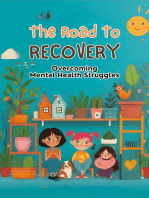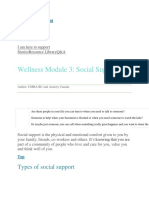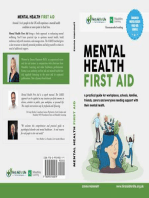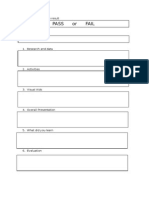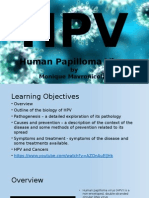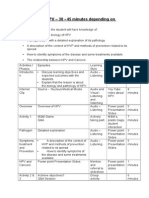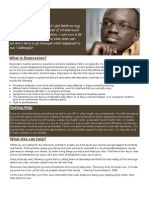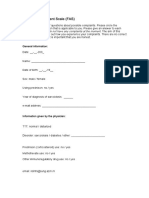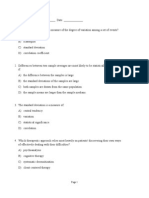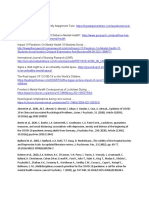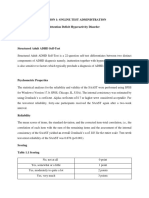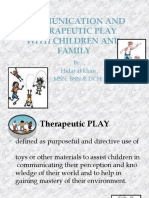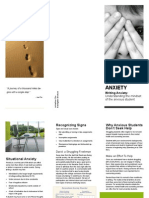Building Resilience, Promoting Wellbeing
Uploaded by
Monique MavronicolasBuilding Resilience, Promoting Wellbeing
Uploaded by
Monique MavronicolasBuilding
resilience,
promoting
wellbeing
Mental health
We all have mental health.
Mental health relates to
how we think, feel, behave
and interact with other
people.
Just as we can develop problems with our
physical health, mental health problems will
be experienced by many of us over the
course of our lives.
One in four people will experience a
mental health problem each year
- Anxiety and
depression are the
most common
problems, with
about 1 in 10
people affected at
any given time.
- 1-2 people in every
100 will experience
a serious mental
health problem
such as bipolar
disorder, psychosis
or schizophrenia in
their life.
Not all mental health problems are
preventable. But there are some things we
can do to look after our mental health, for
example, promoting mental wellbeing and
building resilience
Wellbeing
This presentation
focuses on mental
rather than physical
wellbeing
How would you
define wellbeing?
The World Health Organisation defines
wellbeing as:
a state of mind in which an individual is
able to realise his or her own abilities,
cope with the normal stresses of life, can
work productively and fruitfully, and is
able to make a contribution to his or her
community.
Wellbeing is made up of two key
elements:
1.Feeling good
2.Functioning well
What kinds of things contribute to your own
sense of mental wellbeing?
Resilience
Resilience is the ability to cope with lifes
challenges and to adapt to adversity.
Your levels of resilience can change over the
course of your life.
Why are wellbeing and resilience
important?
Resilience is important because it can help
to protect against the development of some
mental health problems. Resilience helps us
to maintain our wellbeing in difficult
circumstances.
What type of things make you feel more or
less resilient and able to cope?
High levels of wellbeing and resilience in a
community dont just lead to fewer mental
health problems
Good levels of wellbeing are associated with:
Improved learning and academic achievement
Reduced absence from work due to sickness
Reductions in risk-taking behaviours like smoking
Improved physical health
Reduced mortality
Increased community involvement
People at higher risk of low wellbeing
Some people in our community face significant
challenges and may need more support than others to
improve their wellbeing, for example people who are:
-
Socially isolated
From Black or minority ethnic groups
On low incomes or unemployed
Living with a long term health condition
How could you support these groups in your
community?
Men from households with
the lowest 20% of
incomes are almost 3
times more likely to have
a common mental
disorder than those with
the top 20%
Black and minority ethnic
people are nearly 3
times more likely to
attempt suicide
People with less than three
close relatives or friends
are more likely to experience
mental health problems
Rates of depression
are double in those
with long term health
conditions than in the
rest of the population
22% of gay and
bisexual men are
currently experiencing
moderate to severe
levels of depression
Improving wellbeing
There are a whole range of ways that we
can improve our wellbeing and resilience.
The New Economics Foundation has set out
five things that we can all do to improve our
wellbeing.
Connect
With the people around
you. With family, friends,
colleagues and
neighbours. At home,
work, school or in your
local community. Think of
these as the cornerstones
of your life and invest time
in developing them.
Building these connections
will support and enrich
you every day.
Be active
Go for a walk or run. Step outside. Cycle. Play a
game. Garden. Dance. Exercising makes you feel
good. Most importantly, discover a physical activity
you enjoy and that suits your level of mobility and
fitness.
Take notice
Be curious. Catch sight of the beautiful. Remark on the
unusual. Notice the changing seasons. Savour the moment,
whether you are walking to work, eating lunch or talking to
friends. Be aware of the world around you and what you
are feeling. Reflecting on your experiences will help you
appreciate what matters to you.
Give
Do something nice for a
friend, or a stranger.
Thank someone. Smile.
Volunteer your time. Join a
community group. Look
out, as well as in. Seeing
yourself, and your
happiness, linked to the
wider community can be
incredibly rewarding and
creates connections with
the people around you.
Keep learning
Try something new. Rediscover an old interest. Sign up for
that course. Take on a different responsibility at work. Fix a
bike. Learn to play an instrument or how to cook your
favourite food. Set a challenge you will enjoy achieving.
Learning new things will make you more confident as well
as being fun.
What can you do?
These are not just things that people should do by
themselves. Community groups, services, resources and
facilities also play a role in helping people to understand
the things they can do for their wellbeing, and supporting
people to do them.
What services/activities do you provide
that promote each of the five ways to
wellbeing?
Its likely that your organisation is already
supporting the wellbeing of the people you work
with, even if you are not aware of it.
But if you would like to do more, here are some
ideas of the kind of things you could do to improve
wellbeing:
1. Promote the five ways to wellbeing
Think about ways you could make the five ways to
wellbeing a central part of the services, activities or
support you provide.
Could you organise some physical activities, like a sports team
or walking club, helping people to be active?
Could you organise creative activities that help people take
notice and learn, perhaps art or cooking classes, or run a book
group?
Could you facilitate opportunities for people to give their time
and volunteer in the community
2. Improve opportunities for social
connection
Can you do more to bring people
together in the work that you so,
helping them to build more social
connections?
Could you provide a befriending
service for the most isolated
people in your community?
Could you facilitate peer support
groups for people with similar life
experiences to come together?
3. Raise awareness of mental health,
wellbeing and resilience
Lots of people dont feel confident
talking about mental health and
wellbeing or know enough about
what they can do to help.
Raising awareness about mental
health can be an important step in
making every contact we have
with someone in the local
community count for wellbeing.
4. Make sure your services are
accessible and welcoming
Ensure that your
services are
appropriate to people
of all ages, sexual
orientations,
disabilities, gender,
and race
5. Think about the impact your services
have on the wellbeing of your community
Could you measure the
impact your group has
on community
wellbeing, using a tool
like the New Economics
Foundations handbook,
measuring wellbeing?
6. Connect with other community
organisations
Consider ways you
could work
together with
other organisations
in the community
to improve
wellbeing.
7. Provide information about other
services in your area
Think about pulling
together a list of
other groups and
services in your area
that you think might
be helpful in
supporting the
wellbeing of the
people you work with.
Recognising mental
health problems
You may come across
people who you think
might be experiencing
more than just low
wellbeing, but may be
developing a mental
health problem.
The first signs of mental
health problems will differ
from person to person
and are not always easy
to spot.
Some common early signs of a mental
health problem that you may notice in
someone include:
Increasingly
anxious
Poor motivation
Dramatic change of personality
Being on edge
Hearing and seeing things that others dont
Highly emotional
Restlessness
Becoming socially isolated
Hyperactivity
Unresponsive
Lack of energy
Indifferent
Irrational
Self-absorbed
Poor personal presentation
Problems with sleep
Lack of interest in activities that were previously enjoyed
Making statements of self-worthlessness
Distracted
Poor concentration
Extreme mood swings
Helping people get the right support
If you think someone is experiencing a mental health
problem and needs help, there are a range of people and
organisations that offer advice, support and treatment:
GPs can be the first point of contact for many people
they can offer treatment and advice and can make referrals
for more support.
If someone is experiencing severe mental distress they
can make an emergency appointment with their GP, or go
to the local A&E department. If you are worried that
someone is at immediate risk of harming themselves or
others you should call 999.
Helplines and websites
There are lots of national telephone helplines and websites
that can be contacted for support, with many available 24/7.
The booklet that accompanies this presentation contains the
contact details for many of these.
How to change things in your area
If you feel strongly that more needs to be done to
support the wellbeing of people in your community
there are local decision-makers and organisations
that you can contact:
Your local MP
Your local councillor
Healthwatch
For more information, the accompanying booklet and full report
please see www.mind.org.uk/publicmentalhealth
Were Mind, the mental health charity.
We believe no one should have to face a mental
health problem alone. Were here for you. Today.
Now. Whether youre stressed, depressed or in
crisis. Well listen, give support and advice, and
fight your corner.
Registered Charity No. 219830 Registered No. 424348 England
The Mental Health Foundation is a UK-wide
charity that carries out research, campaigns for
better mental health services, and works to raise
awareness of all mental health issues to help us
all lead mentally healthier lives.
Registered Charity Nos: (England & Wales) 801130: (Scotland) SC 039714.
This presentation is one of a series of resources produced on behalf of the
Mental Health Strategic Partnership with funding from the Department of
Health. The Mental Health Strategic Partnership comprises:
You might also like
- Mental Health & Psychiatric Nursing - Filling Questions90% (10)Mental Health & Psychiatric Nursing - Filling Questions8 pages
- Example of Nursing Care Plan: Dr. Evelyn M Del MundoNo ratings yetExample of Nursing Care Plan: Dr. Evelyn M Del Mundo20 pages
- Getting Help: Assignment Title/Briefing: Mental Health ServicesNo ratings yetGetting Help: Assignment Title/Briefing: Mental Health Services5 pages
- TDC_12_Areas_Health_#6_Your_Wider_CommunityNo ratings yetTDC_12_Areas_Health_#6_Your_Wider_Community9 pages
- Kirklees Advocacy Service Annual Report 11-12No ratings yetKirklees Advocacy Service Annual Report 11-1215 pages
- 26 Activities To Celebrate World Mental Health Day (2022)No ratings yet26 Activities To Celebrate World Mental Health Day (2022)11 pages
- Celeste Carrazco - All Other Body ParagraphsNo ratings yetCeleste Carrazco - All Other Body Paragraphs2 pages
- Better Together: How to Support the Proactive Mental Health of Family, Friends and CoworkersFrom EverandBetter Together: How to Support the Proactive Mental Health of Family, Friends and CoworkersNo ratings yet
- A. Physical Education How Can My Participation in Hip-Hop Activities Best Influence The Fitness Development of My Society's Fitness?No ratings yetA. Physical Education How Can My Participation in Hip-Hop Activities Best Influence The Fitness Development of My Society's Fitness?2 pages
- Twitter and FB As A Medium For Mental Health AwarenessNo ratings yetTwitter and FB As A Medium For Mental Health Awareness6 pages
- Spinelli Mental Health in The Time of COVID The Pandemic Under The PandemicNo ratings yetSpinelli Mental Health in The Time of COVID The Pandemic Under The Pandemic5 pages
- The Importance of Mental Health Awareness in SocietyNo ratings yetThe Importance of Mental Health Awareness in Society3 pages
- Mental Health Issues in Millennials GenerationNo ratings yetMental Health Issues in Millennials Generation2 pages
- Ten Things You Can Do For Your Mental Health: 1. Value YourselfNo ratings yetTen Things You Can Do For Your Mental Health: 1. Value Yourself15 pages
- Theory Assessment Task 1: Enhancing Personal and Community HealthNo ratings yetTheory Assessment Task 1: Enhancing Personal and Community Health5 pages
- The Importance of Mental Health AwarenessNo ratings yetThe Importance of Mental Health Awareness2 pages
- Do Think Most People Realize How Common Mental Illness Is in The PopulationNo ratings yetDo Think Most People Realize How Common Mental Illness Is in The Population3 pages
- The Importance of Mental Health AwarenessNo ratings yetThe Importance of Mental Health Awareness1 page
- Disability Connection Newsletter - May 2015 - DisabilityNo ratings yetDisability Connection Newsletter - May 2015 - Disability4 pages
- The Importance of Mental Health AwarenessNo ratings yetThe Importance of Mental Health Awareness2 pages
- Mental Health and The Stigma Surrounding ItNo ratings yetMental Health and The Stigma Surrounding It1 page
- Alegado - Finals - Mental Health AwarenessNo ratings yetAlegado - Finals - Mental Health Awareness3 pages
- The Importance of Mental Health Awarenes2No ratings yetThe Importance of Mental Health Awarenes22 pages
- The Importance of Mental Health Awarenes1No ratings yetThe Importance of Mental Health Awarenes12 pages
- The Importance of Mental Health Awareness in Modern SocietyNo ratings yetThe Importance of Mental Health Awareness in Modern Society2 pages
- Monique Mavronicolas - Research ProjectNo ratings yetMonique Mavronicolas - Research Project44 pages
- Monique Mavronicolas - Research Project ProposalNo ratings yetMonique Mavronicolas - Research Project Proposal3 pages
- Advanced Practice Nurses: Promoting Evidence Based Practice and Capturing Impact: Lessons From Two UK StudiesNo ratings yetAdvanced Practice Nurses: Promoting Evidence Based Practice and Capturing Impact: Lessons From Two UK Studies34 pages
- Pass or Fail: Mark - Please Circle The ResultNo ratings yetPass or Fail: Mark - Please Circle The Result1 page
- Human Papilloma Virus: by Monique MavronicolasNo ratings yetHuman Papilloma Virus: by Monique Mavronicolas13 pages
- Preventing Illness and Living With Ill HealthNo ratings yetPreventing Illness and Living With Ill Health11 pages
- Background of The Research Results of The ResearchNo ratings yetBackground of The Research Results of The Research1 page
- SYBA Psychology Syllabus 2020-21 - 08.072020 PDFNo ratings yetSYBA Psychology Syllabus 2020-21 - 08.072020 PDF20 pages
- Mental Health Screening and Evaluation Compendium PDF100% (1)Mental Health Screening and Evaluation Compendium PDF78 pages
- Different Sources of Stress Among Grade 11 Stem Students of San Juan de Dios Educational Foundation Inc. - College On First Semester Academic Year 2018 - 2019No ratings yetDifferent Sources of Stress Among Grade 11 Stem Students of San Juan de Dios Educational Foundation Inc. - College On First Semester Academic Year 2018 - 20197 pages
- Rahul Shaik Kamala Kumari.P Syed Ahmed Basha: BackgroundNo ratings yetRahul Shaik Kamala Kumari.P Syed Ahmed Basha: Background6 pages
- Fatigue Assessment Scale (FAS) : Even If You Do Not Have Any Complaints at The MomentNo ratings yetFatigue Assessment Scale (FAS) : Even If You Do Not Have Any Complaints at The Moment2 pages
- The Use of A Decision-Based Forgiveness Intervention Within Intergenerational Family TherapyNo ratings yetThe Use of A Decision-Based Forgiveness Intervention Within Intergenerational Family Therapy19 pages
- Diagnostic and Statistical Manual of Mental Disorders, Fourth Edition (DSM-IV)No ratings yetDiagnostic and Statistical Manual of Mental Disorders, Fourth Edition (DSM-IV)2 pages
- The Interpersonal Theory of Harry Stack Sullivan PDF0% (1)The Interpersonal Theory of Harry Stack Sullivan PDF3 pages
- Relationship Between Borderline Personality Symptoms and Internet Addiction: The Mediating Effects of Mental Health ProblemsNo ratings yetRelationship Between Borderline Personality Symptoms and Internet Addiction: The Mediating Effects of Mental Health Problems8 pages
- Mental Health & Psychiatric Nursing - Filling QuestionsMental Health & Psychiatric Nursing - Filling Questions
- Example of Nursing Care Plan: Dr. Evelyn M Del MundoExample of Nursing Care Plan: Dr. Evelyn M Del Mundo
- Getting Help: Assignment Title/Briefing: Mental Health ServicesGetting Help: Assignment Title/Briefing: Mental Health Services
- 26 Activities To Celebrate World Mental Health Day (2022)26 Activities To Celebrate World Mental Health Day (2022)
- Better Together: How to Support the Proactive Mental Health of Family, Friends and CoworkersFrom EverandBetter Together: How to Support the Proactive Mental Health of Family, Friends and Coworkers
- A. Physical Education How Can My Participation in Hip-Hop Activities Best Influence The Fitness Development of My Society's Fitness?A. Physical Education How Can My Participation in Hip-Hop Activities Best Influence The Fitness Development of My Society's Fitness?
- Twitter and FB As A Medium For Mental Health AwarenessTwitter and FB As A Medium For Mental Health Awareness
- Spinelli Mental Health in The Time of COVID The Pandemic Under The PandemicSpinelli Mental Health in The Time of COVID The Pandemic Under The Pandemic
- The Importance of Mental Health Awareness in SocietyThe Importance of Mental Health Awareness in Society
- The Road To Recovery: Overcoming Mental Health StrugglesFrom EverandThe Road To Recovery: Overcoming Mental Health Struggles
- Ten Things You Can Do For Your Mental Health: 1. Value YourselfTen Things You Can Do For Your Mental Health: 1. Value Yourself
- Theory Assessment Task 1: Enhancing Personal and Community HealthTheory Assessment Task 1: Enhancing Personal and Community Health
- Do Think Most People Realize How Common Mental Illness Is in The PopulationDo Think Most People Realize How Common Mental Illness Is in The Population
- Disability Connection Newsletter - May 2015 - DisabilityDisability Connection Newsletter - May 2015 - Disability
- The Importance of Mental Health Awareness in Modern SocietyThe Importance of Mental Health Awareness in Modern Society
- Advanced Practice Nurses: Promoting Evidence Based Practice and Capturing Impact: Lessons From Two UK StudiesAdvanced Practice Nurses: Promoting Evidence Based Practice and Capturing Impact: Lessons From Two UK Studies
- Background of The Research Results of The ResearchBackground of The Research Results of The Research
- Mental Health Screening and Evaluation Compendium PDFMental Health Screening and Evaluation Compendium PDF
- Different Sources of Stress Among Grade 11 Stem Students of San Juan de Dios Educational Foundation Inc. - College On First Semester Academic Year 2018 - 2019Different Sources of Stress Among Grade 11 Stem Students of San Juan de Dios Educational Foundation Inc. - College On First Semester Academic Year 2018 - 2019
- Rahul Shaik Kamala Kumari.P Syed Ahmed Basha: BackgroundRahul Shaik Kamala Kumari.P Syed Ahmed Basha: Background
- Fatigue Assessment Scale (FAS) : Even If You Do Not Have Any Complaints at The MomentFatigue Assessment Scale (FAS) : Even If You Do Not Have Any Complaints at The Moment
- The Use of A Decision-Based Forgiveness Intervention Within Intergenerational Family TherapyThe Use of A Decision-Based Forgiveness Intervention Within Intergenerational Family Therapy
- Diagnostic and Statistical Manual of Mental Disorders, Fourth Edition (DSM-IV)Diagnostic and Statistical Manual of Mental Disorders, Fourth Edition (DSM-IV)
- The Interpersonal Theory of Harry Stack Sullivan PDFThe Interpersonal Theory of Harry Stack Sullivan PDF
- Relationship Between Borderline Personality Symptoms and Internet Addiction: The Mediating Effects of Mental Health ProblemsRelationship Between Borderline Personality Symptoms and Internet Addiction: The Mediating Effects of Mental Health Problems





























